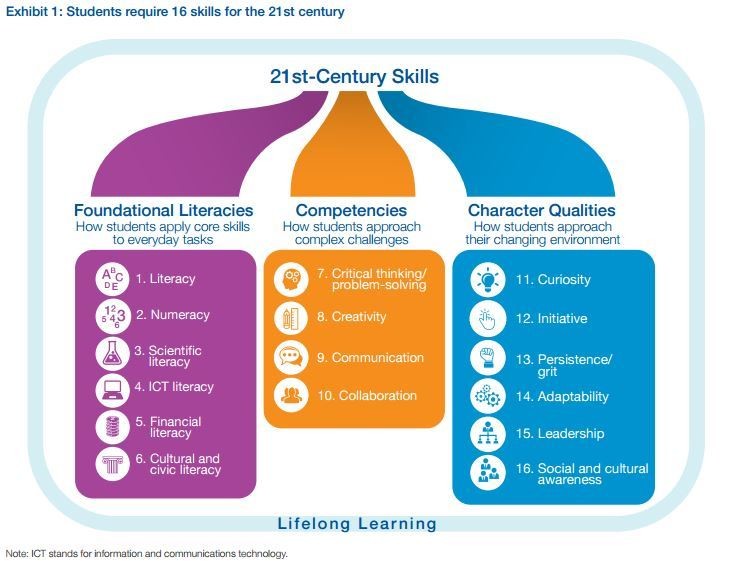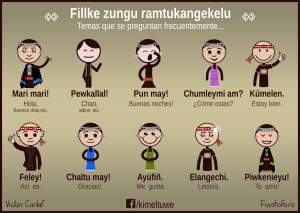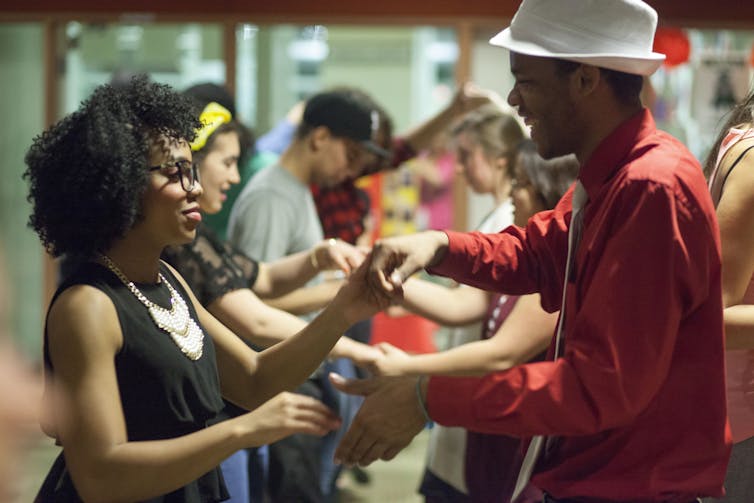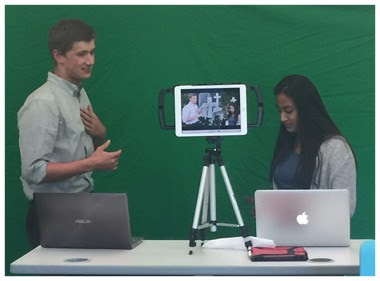Upcoming meeting:
Wednesday, December 6th
3:30-4:30 IS Latin Room 186
Cindy oral presentations
Esther- Quizlet Live (bring laptops)
Esther- Quizlet Live (bring laptops)
Announcements:
Conferences- Sara Matey FETC
Mimsy- August Academics
Conferences- Sara Matey FETC
Mimsy- August Academics
Intercultural ice breaker- handouts
- Discussion of language team goals 2016-17 WL Goals
- Working on: Enrollment conversation
- Upper school Flow Charts: new course proposals?
-
21st Century Skills Lead with Languages
The gap between the skills people learn and the skills people need is becoming more obvious, as traditional learning falls short of equipping students with the knowledge they need to thrive, according to the World Economic Forum report New Vision for Education: Fostering Social and Emotional Learning Through Technology.
Building Bridges in Languages: Please remember that Jenni Hoffman in second grade is still looking for a language partner. Jenni's times are mornings either 8-8:30 or 9:10-9:30. Michelle O'Hara has also offered LS library times if Jenni's don't work with your schedule.
Reinvigorating Teaching Toward a Student-Centered Classroom
Five Rules for the Three Modes of Communication
In order to help students better master the units we teach, remember these rules when selecting activities:
- They must be authentic.
- They should always be engaging.
- Activities should be varied.
- They need to be focused on the unit theme.
- Perhaps most importantly, they should force students to use the target language.
What are you? A Language Teacher or Acquisition Facilitator?
So how can language teachers facilitate “communicative” experiences that will lead to real communication and result in acquisition? The first step is to shift one’s mindset from that of being an instructor to that of being a facilitator, since explicit instruction will not result in unconscious acquisition. The second step is to recognize that acquisition can only be facilitated by providing sufficient doses of comprehensible input (CI). Click here to read more.
Primary Source Resources Browse select resource guides here.

Tech Corner:
Hour of Code:Students can do their coding in another language. They get a certificate of completion when they finish.
Hour of Code
Using Wordless Short Films in the Language Classroom
Español
Peer Grading Tool
Peer Grade
Google Expeditions: Like taking the Magic School Bus!
Take a field trip to another country! Look at the ruins! Check out the virtual possibilities!
Google Expeditions
Memrise- Like Duolingo but different: We use mems to help you form vivid, sensory memories. We test you continuously, always making sure to give your brain just the right workout. We remind you of what you've learned at scientifically optimized times so your memories are always growing stronger, and never forgotten.
Memrise
Teachers Toolbox
Here are the two statements that were shared at the last meeting:Accommodations...continued:Teaching WL to kids with dyslexia
From Jonathan Shee- OESIS, French teacher at St. Luke's School
Working with students who have language based learning disabilities can present some additional challenges when learning a world language. Some basic strategies might help eliminate major stress points along the way - here are some suggestions for what to take a look at or focus on:
* Course selection - generally speaking, world languages that have a phonetic basis tend to be easier for students with language processing issues. Oftentimes, students who have received help for their learning challenges have acquired the strategies and structures for breaking words down into component parts - therefore integrating similar patterns may help a student pick up new words and structures.
* Prioritize speaking and listening while not focusing on accuracy. Usually the end goal of learning a world language is for students to be able to interact in conversation, therefore letting them hear the sounds/patterns/intonation of spoken language and integrate new words in their responses without being assessed is very important to establish a level of comfort in the new language. Allowing for mistakes permits students to build their vocabulary, integrate grammatical structures and learn response patterns - all skills teachers want to establish within a language class.
* When working with grammar - use context cues, mnemonics and patterns to help students recall information when needed. If students learn a song that goes with verb endings, even if they have to start at the beginning, they can eventually apply the correct ending. By allowing them to have a starting point and follow the same pattern, you are playing to the strengths of a student who struggles with language learning. Again, when directly worked with, students can learn the patterns and rhythms of a language - they may just need help with the first step!
Additional strategies include:
*Be sure to use a clear and understandable font when giving out work/projecting materials
*Help students identify the speaker in the sentence (ie - circle it!), this will help them with verb conjugation
*When reading longer passages, allow for a vocabulary bank that they can reference - try to not force them to translate each word individually as that loses the context /main idea of the passage.
*Teach vocabulary that is used regularly - what is used will be remembered, obscure vocabulary should be avoided as it will use up the mental resources you are trying to get to remember the structures/patterns/routines of the target language.
Online resources:
http://dyslexiahelp.umich.edu/
http://www.readandspell.com/
https://www.understood.org/en/
http://www.ldonline.org/
http://dyslexia.yale.edu/
More descriptors from Fairfax County Schools: (Thanks Esther Yu)
Fairfax County Special Needs Document
Descriptors
* Course selection - generally speaking, world languages that have a phonetic basis tend to be easier for students with language processing issues. Oftentimes, students who have received help for their learning challenges have acquired the strategies and structures for breaking words down into component parts - therefore integrating similar patterns may help a student pick up new words and structures.
* Prioritize speaking and listening while not focusing on accuracy. Usually the end goal of learning a world language is for students to be able to interact in conversation, therefore letting them hear the sounds/patterns/intonation of spoken language and integrate new words in their responses without being assessed is very important to establish a level of comfort in the new language. Allowing for mistakes permits students to build their vocabulary, integrate grammatical structures and learn response patterns - all skills teachers want to establish within a language class.
* When working with grammar - use context cues, mnemonics and patterns to help students recall information when needed. If students learn a song that goes with verb endings, even if they have to start at the beginning, they can eventually apply the correct ending. By allowing them to have a starting point and follow the same pattern, you are playing to the strengths of a student who struggles with language learning. Again, when directly worked with, students can learn the patterns and rhythms of a language - they may just need help with the first step!
Additional strategies include:
*Be sure to use a clear and understandable font when giving out work/projecting materials
*Help students identify the speaker in the sentence (ie - circle it!), this will help them with verb conjugation
*When reading longer passages, allow for a vocabulary bank that they can reference - try to not force them to translate each word individually as that loses the context /main idea of the passage.
*Teach vocabulary that is used regularly - what is used will be remembered, obscure vocabulary should be avoided as it will use up the mental resources you are trying to get to remember the structures/patterns/routines of the target language.
Online resources:
http://dyslexiahelp.umich.edu/
http://www.readandspell.com/
https://www.understood.org/en/
http://www.ldonline.org/
http://dyslexia.yale.edu/
More descriptors from Fairfax County Schools: (Thanks Esther Yu)
Fairfax County Special Needs Document
Descriptors
Summer Conference:
ACTFL CAN DO STATEMENTS
Intercultural Can Do Statements
Intercultural Reflection
Science in French
IIE Study Shows That Studying Abroad Has a Direct Impact on Skills Needed for Career Success
Education Abroad Leads to Significant Gains in 11 of 15 critical 21st Century Workplace Skills
STEM majors highly value the gains made in skills outside of their majors during study abroad. Among science majors that went on a program outside of the sciences, 47 percent reported their study abroad contributed to a job offer, whereas among those who went on a science focused experience, only 28 percent reported it contributed to a job offer. STEM majors described academic programs at home as more insular and viewed study abroad as an opportunity to gain “soft” skills that others in their field lack.
Click here for the full article.
| |||||||||||||
|
What does language proficiency mean to SYA?
In this issue, you will explore Southern Lazio with students at SYA Italy; sit in on a global citizenship class with Daniele Gatti; discuss the challenges and opportunities that technology presents to the field of global education with Head of Schools and Programs Aric Visser; and hear what SYA alums have to say about being polyglots. All of these stories have a common theme: the importance of language proficiency, and what it means to SYA today.
Language proficiency has always been at the root of SYA's academic experience. From the first class in 1964, students have been challenged to step outside of their own comfort zone and experience the world from another perspective and through another language. I hope you enjoy this issue of News & Views, and I look forward to hearing from you soon.
Best wishes,

SYA IN THE FIELD: TECH & LANGUAGE
Technology use has a measurable impact on learning a new language, and in this article, Head of Schools and Programs Aric Visser discusses the challenges and opportunities of providing a global education in an increasingly connected world.
SYA Strategic Plan Update and Opportunities for Teachers:


Dear John,
With the season of thanks upon us, I want to take a moment to recognize the important partnership School Year Abroad has with The Potomac School. Thank you, on behalf of all at SYA, for your generous support in making the SYA experience available to your students. You may be interested to learn that 42% of our 2017-2018 class is made up of students from Member Schools. Of those 85 students, 48 (56%) received joint financial aid grants. In rough numbers, Member Schools are supplying us with nearly half our students and are providing more than half of those same students with nearly half of the aid they require to attend SYA. That is indeed something to be thankful for! Needless to say, SYA would not be what it is today without the strength of its consortium.
We have redoubled our efforts to look for ways in which we can give something of value back to our Member Schools, in return for all you give to us. If you have a moment, please click on the link to view our recently-approved Strategic Plan (I will be sending you a hard copy in the mail as well). One of the five goals listed as a priority for SYA is to improve Member School relations and seek ways in which we can make our partnership more mutually beneficial.
In that vein, I’d like to point out three programs we have updated and formalized in order to provide more benefit for your faculty members :
1. Travel Grants: we have long offered stipends to faculty and staff from Member Schools to help them visit one of our campuses abroad; however, this year, we have increased both the amount of the grant and the total number of grants, allowing more adults from Member Schools to enjoy the benefit.
2. Professional Development: In June 2018, for the third year in a row, we will be offering an Adult Enrichment seminar on our campus in Zaragoza, Spain. The title of the seminar is: 100 Years of Politics in Spanish Film. As we did last year, we will offer a $1,000 discount to any Member School employee who attends.
3. Faculty Positions: We are anticipating several openings for English and math teachers at our SYA schools in 2018-2019. SYA will continue to give preference in the hiring process to faculty from our Member Schools.
More detailed information and links will be sent out to all Member School faculty and staff before winter break. But for the moment, if you know of teachers at The Potomac School who may want to take advantage of these opportunities, please direct them to Whitney Hermann at whermann@sya.org, and she will be able to guide them through the process.
With best wishes for Thanksgiving,
Thomas E. Hassan

President
SYA IN THE FIELD: TECH & LANGUAGE
Technology use has a measurable impact on learning a new language, and in this article, Head of Schools and Programs Aric Visser discusses the challenges and opportunities of providing a global education in an increasingly connected world.
SYA Strategic Plan Update and Opportunities for Teachers:
 | ||
|
















